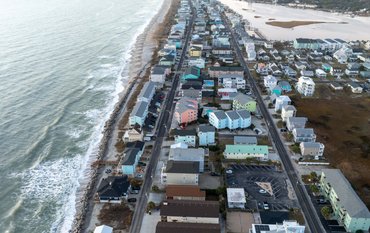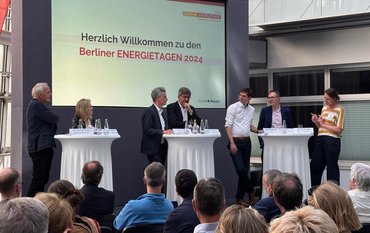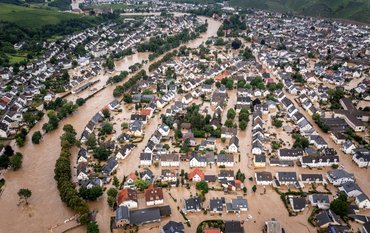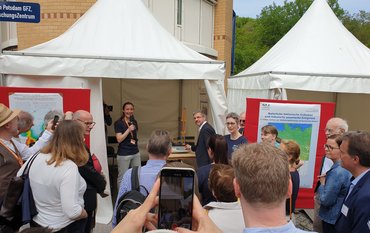On 22 December 2018, a flank of the Anak Krakatau volcano slid into the Sunda Strait, a strait between the Indonesian islands of Sumatra and Java. The flank collapse triggered a tsunami that killed at least 430 people. This was despite the fact that Indonesia has a modern tsunami early warning system. The problem: the fatal landslide and the subsequent flooding was a so-called atypical tsunami event. Atypical because it was not triggered by an earthquake with vertical ground movement. Current early warning systems are based on seismic detection, which is why atypical tsunamis have not yet been recognised.
Three years ago, an international group of researchers led by the GFZ joined forces in the "Tsunami_Risk" project in order to enable the existing early warning systems in the future to detect such events. This project recently came to an end with a final workshop at the GFZ. From 18-21 February 2024, the successes of the project were hightlighted and the follow-up work discussed. An invited 10-member delegation from the National Agency for Research and Innovation (BRIN), the Office of Meteorology, Climatology and Geophysics (BMKG) and various universities from Indonesia provided support, in particular to ensure the utilisation of the results in Indonesia. New and innovative methods and results of the research project's work packages were also presented at the workshop. Representatives of all participating institutes GFZ, DLR, FU and TU Berlin, TU Braunschweig, THW and Gempa, as well as the BMBF, the German Embassy in Jakarta and many others were present. The Scientific Executive Director of the GFZ, Prof Dr Susanne Buiter, opened the event and also mentioned the danger of atypical tsunamis in our regions, for example off Norway.
The "Tsunami_Risk" project
The aim of those involved in "Tsunami_Risk" was to better understand the dangers of atypical tsunamis and to review early warning systems, particularly in the case of tsunamis triggered by landslides. At the same time, the project aimed to develop recommendations for policymakers. The project therefore also addressed social and socio-scientific aspects of risk management.
GFZ's focus was on identifying risk areas, volcano monitoring using radar remote sensing and modelling, and seismic monitoring. The GFZ experts used extensive databases and statistical methods to create hazard maps for regions threatened by landslide-triggered tsunamis. A regionalisation of the hazards was identified, which means, for example, that volcanoes lead to tsunamis in eastern Indonesia in particular, whereas earthquakes occur along the entire archipelago. In addition, the scientists have modelled the propagation time of tsunami waves even more accurately than before and can use seismic data to locate the characteristic low-frequency "scratching" of sliding rock masses. Very evident deformations and changes in the volcanoes are usually recognisable even before slopes slide. This knowledge will be used to improve the monitoring of the regions.
The scientists also analysed the extent to which local decision-makers and the population can be involved and informed, which includes risk management and disaster risk reduction at the municipal level. Work on the recommendations for the transfer of knowledge into practice is still ongoing, but has largely been finalised in close coordination with BRIN and BMKG. The recommendations for policymakers, on the other hand, have already been set out in a strategy paper. This is now being submitted to the Indonesian government by the Indonesian partner organisations.
Link to the project website
Project partner in Germany
- Germand Research Center for Geosciences GFZ
- Deutsches Zentrum für Luft- und Raumfahrt e. V. (DLR)
- Freie Universität Berlin (FUB)
- Technical University Berlin (TUB)
- Technical University Braunschweig (TU-BS), Leichtweiß-Institut für Wasserbau und Wasserressourcen
- Bundesanstalt Technisches Hilfswerk (THW)
Project partner in Indonesia
- Universitas Indonesia (UI)
- Institut Teknologi Bandung (ITB)
- Universitas Gadjah Mada (UGM)
- Indonesian Institute of Sciences (LIPI)
- Indonesian Agency for Meteorology, Climatology and Geophysics (BMKG)
- National Institute of Aeronautics and Space (LAPAN)
- The Agency for the Assessment & Application of Technology (BPPT)
- National Disaster Management Authority (BNPB)
- Geological Agency of Indonesia (Badan Geologi)
Information on the funding programme
With the funding programme "CLIENT II - International Partnerships for Sustainable Innovation", the Federal Ministry of Education and Research (BMBF) is promoting demand-oriented research cooperation with selected emerging and developing countries.


![[Translate to English:] [Translate to English:] Insel-Vulkan mit Aschewolke, im Vordergrund ist ein ruhiges Meer zu sehen](/fileadmin/_processed_/2/7/csm_20240311_Anak-Krakatau_AdobeStock_69905047_bd3d2eb35c.jpeg)
![[Translate to English:] Group picture with 27 people](/fileadmin/_processed_/e/6/csm_Tsunami_Risk_Projekt_Abschlussworkshop_Februar_2024_3e84f52b0d.jpeg)
![[Translate to English:] Karte](/fileadmin/_processed_/3/3/csm_Ranking_Results_Tsunami_risks_by_vulcanos_in_Indonesia_af15d45deb.jpeg)







![[Translate to English:] Group photo with 7 people in front of a new metal plant in a large laboratory hall.](/fileadmin/_processed_/0/4/csm_20240628-GFZ_Einweihung_Triax-Anlage-PRESSE_Abb1_040_c-Bahlo-GFZ_187906cb48.jpeg)




![[Translate to English:] Heidi Kreibich, woman with short brown hair and blue eyes. She is wearing a grey cardigan and a red polo shirt](/fileadmin/_processed_/6/6/csm_kreibich-Heidi_1_Querformat_he-2021_2dedd3ef33.jpeg)




![[Translate to English:] [Translate to English:] Totes Meer gesehen von einem Hügel am Ufer](/fileadmin/_processed_/0/f/csm_20240612-web_AdobeStock_151245578_cb8e2706f3.jpeg)




![[Translate to English:] Gruppenfoto im Hörsaal](/fileadmin/_processed_/8/a/csm_240528-GfZ-ERC-Grantees-Gruppe_31be9704f5.jpeg)
![[Translate to English:] Susanne Buiter in front of a blue wall with GFZ logo](/fileadmin/_processed_/d/7/csm_20220721-GFZ-Portrait-Buiter-1-he-web_-c-Reinhardt_Sommer_2a6e3b8ae1.jpeg)
![[Translate to English:] [Translate to English:] Drohne](/fileadmin/_processed_/b/a/csm_20240515_155801_d696ee4200.jpeg)



![[Translate to English:] ein riesiges Erdloch in einer kargen Landschaft im Iran mit Bergen im Hintergrund](/fileadmin/_processed_/f/1/csm_DSC_7917_kleiner_f14e27f7ad.jpeg)

![[Translate to English:] Lecture room at GFZ with participants](/fileadmin/_processed_/a/9/csm_P1140796__002__c03fcad8bd.jpeg)

